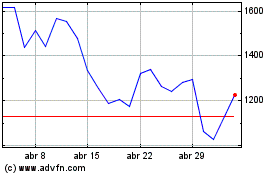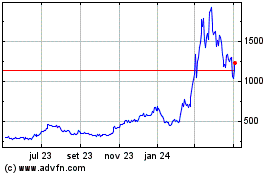Bitcoin gears up for halving: Subtle recovery and projections in
the cryptoasset market
After hitting a low of $58,800 last week, Bitcoin (COIN:BTCUSD)
experienced a slight recovery, gaining 0.5% in the last 24 hours to
reach $63,806, with the next halving scheduled to occur in less
than 12 hours. Meanwhile, Ether (COIN:ETHUSD) is trading at $3,054.
The halving, an event that halves the supply of new bitcoins, is
scheduled for this Friday or Saturday. Expectations surrounding
this event have generated a historic peak in online interest,
according to data from the Santiment platform, which analyzes
social volume and dominance on the topic. This year, interest
fluctuated, with peaks in February and March, and continuous growth
in April. Over the past few weeks, this interest has doubled, while
the price of Bitcoin fluctuated between $70,000 and $58,800.
Interactions on social platforms varied, with declines on Telegram
and increases on Reddit, while Twitter and Bitcointalk presented
their own dynamics. Google Trends suggests that the halving could
break all previous search records. Fernando Pereira, an analyst at
Bitget, suggests that, following historical trends, the halving
could kick off a new bull market. “Usually, the quarter after
the halving marks the resumption of an uptrend and the beginning of
a bull market. If the pattern repeats itself, Bitcoin could reach
$100,000 by the end of the year,” he says. A recent report
from Coinbase (NASDAQ:COIN) indicates that, even with solid
fundamentals, the post-halving cryptoasset market trajectory will
be influenced by macroeconomic factors such as geopolitical
tensions, high interest rates, and national debt growth. This
reinforces Bitcoin’s position as a macro asset, increasingly seen
as ‘digital gold’ by a segment of investors, while others still
consider it speculative.
Indicators of changing trends in Bitcoin ETF fund flows
On April 18, Bitcoin ETFs saw a small outflow of $4.3 million,
marking the fifth consecutive day of outflows, albeit the smallest
in this period, suggesting a possible change in sentiment.
Grayscale’s ETF (AMEX:GBTC) reported outflows of $90 million,
bringing its total outflows to $16.684.7 billion, but its average
daily outflow has decreased since April 8. On the other hand, other
ETFs from BlackRock (NASDAQ:IBIT) and Fidelity (AMEX:FBTC) recorded
inflows of $18.8 million and $37.4 million, respectively. Bitwise
(AMEX:BITB), 21Shares (AMEX:ARKB), and VanEck (AMEX:HODL) ETFs also
recorded inflows. Since launch, Bitcoin ETFs have accumulated
$12,266.7 billion in net inflows.
Michael Saylor’s stock selling strategy yields $370 million
Last year, Michael Saylor, founder of MicroStrategy
(NASDAQ:MSTR) and prominent bitcoin advocate, implemented a stock
selling plan that allowed the sale of up to 400,000 shares in the
first four months of 2024. This strategic agreement yielded
approximately $370 million from this year’s stock sales, benefiting
greatly from MicroStrategy’s significant appreciation, primarily a
bitcoin holding company. Since 2020, the company has acquired over
214,000 bitcoins, representing about 1% of the total issued of this
cryptocurrency, currently valued at approximately $13.6 billion.
Despite a recent dip, MicroStrategy’s shares have risen 91% this
year, after a 346% gain in 2023.
Tether expands USDT and XAUT stablecoins on TON blockchain to
enhance global transactions
Tether (COIN:USDTUSD), the stablecoin issuer, announced the
expansion of its USDT and XAUT stablecoins on The Open Network
(TON) blockchain as revealed on April 19. The strategy aims to
enhance the use of stablecoins in cross-border and peer-to-peer
transactions for Telegram’s 900 million users. The integration is
expected to boost activity and liquidity on TON, facilitating
access to capital for developers and users. Tether CEO Paolo
Ardoino highlighted that the initiative is in line with the goal of
empowering financial infrastructure across the blockchain.
Recently, Tether minted $11 billion in USDT since March, expanding
its reserves to meet growing demand. During a lecture in Dubai,
Telegram founder Pavel Durov predicted a promising future for
blockchain advertising, with potential to generate billions in
revenue, benefiting everyone from administrators of large groups to
content creators. By adopting blockchain, Telegram could circumvent
payment restrictions imposed by tech giants and advance in the
tokenization of stickers and emojis. Additionally, the platform has
already moved $350 million through the sale of tokenized
namespaces.
Crypto.com’s entry into the South Korean market faces regulatory
challenges
Crypto.com refuted a report suggesting issues in its expansion
into the South Korean cryptocurrency market, attributed to a
possible regulatory delay in approving changes in the leadership of
its local entity. The global cryptocurrency exchange, which
acquired OK-BIT in 2022, plans to launch a new trading platform in
South Korea on April 29. The news came after reports that the South
Korean Financial Intelligence Unit had postponed approval of the
leadership transition from Rafael Melo to Eric Anziani. Crypto.com
denied that this would affect its launch plans.
Changpeng Zhao’s situation at Binance in the US and changes in the
company
Yi He, one of the founders of Binance, mentioned that former CEO
Changpeng Zhao is in a calm phase in the United States as he awaits
his sentencing on April 30. He shared during a Binance Chinese
community meeting in Dubai that Zhao’s situation is generally calm
despite regulatory pressures. Zhao pleaded guilty to financial
violations in the US and agreed to pay fines. Binance has
implemented compliance improvements after admitting guilt in
similar cases. Richard Teng took over as CEO after Zhao’s
resignation in November.
SEC strengthens case against Justin Sun and other defendants
The US SEC updated its complaint against Justin Sun and
associates on April 18, arguing that their multiple visits to the
US justify jurisdiction to prosecute them. It is alleged that Sun
spent over 380 days in the country between 2017 and 2019,
conducting business on behalf of the Tron Foundation (COIN:TRXUSD)
and BitTorrent. The SEC seeks to use these trips as a basis for
regulatory and legal proceedings in the US.
Kraken acquires TradeStation Crypto to expand regulatory presence
in the US
Kraken, a cryptocurrency exchange, is acquiring TradeStation
Crypto, a subsidiary of TradeStation Group. The purchase aims to
strengthen regulatory presence in the US, expanding growth
opportunities and products. Although TradeStation Crypto has
licenses in several states, it faced regulatory issues, including a
$1.5 million settlement with the SEC for failing to register a
crypto lending product. Kraken is also involved in regulatory
disputes but seeks to defend its position.
Dismantling of FTX and license suspension
Struggling FTX exchange moved its treasury assets to a new
wallet on April 18. Arkham Intelligence records show that this
change included 195.87 million FTT tokens (COIN:FTTUSD), 1,938 ETH,
and 6.36 million JoeToken (COIN:JOEUSD). Now, the treasury wallet
holds only about $205 in digital assets, a drastic drop from the
previous balance of $612 million. FTT’s devaluation follows
revelations about financial manipulation, while regulatory issues
persist, with FTX Europe’s license suspended until September
2024.
Avraham Eisenberg convicted of $110 million cryptocurrency fraud at
Mango Markets
28-year-old Avraham Eisenberg of San Juan was convicted of a
cryptocurrency manipulation scheme, marking the Department of
Justice’s first case in this market. He faces up to 20 years in
prison for defrauding the Mango Markets exchange and clients,
artificially inflating the price of futures contracts and the Mango
cryptocurrency (COIN:MNGOUSD), then disappearing with borrowed
funds. Sentencing is scheduled for July 29.
Avail announces upcoming token distribution
The Avail project, focused on blockchain Data Availability (DA),
revealed plans for a future token distribution following leaked
eligibility criteria. According to an official blog post, 354,605
wallet addresses qualify to receive 600 million tokens in the
“unification drop.” The distribution targets developers, testnet
contributors, rollup users, and stakers, with claim verification
until May 4.
Japan contemplates legislation to stimulate DAO growth
In Japan, the government is considering the need to establish a
clear legal framework for Decentralized Autonomous Organizations
(DAOs) to drive the Web3 sector. While the legal status of DAOs
remains uncertain in the US, states like Tennessee, Vermont, and
Wyoming have advanced legislation to accommodate them under
existing LLC regulations. Japan, looking to examples like
Switzerland, seeks to attract international investments and channel
resources into the local economy.
MicroStrategy (NASDAQ:MSTR)
Gráfico Histórico do Ativo
De Abr 2024 até Mai 2024

MicroStrategy (NASDAQ:MSTR)
Gráfico Histórico do Ativo
De Mai 2023 até Mai 2024
